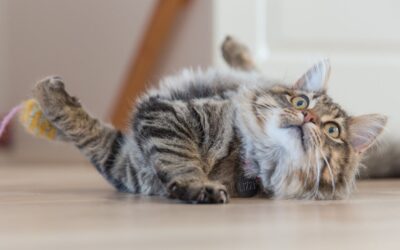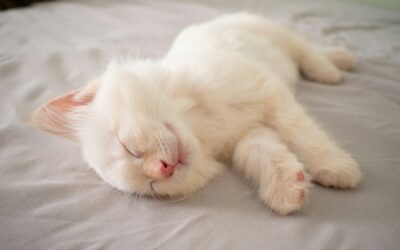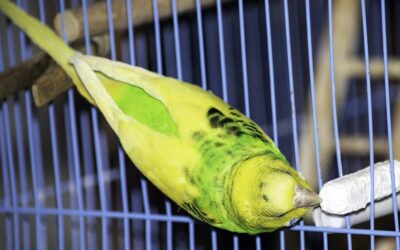Cats are curious little creatures, full of quirks and unique behaviors that both entertain and puzzle their owners. One of those behaviors is licking.
If you’ve wondered, “Why does my cat lick me?”, you’re not alone. Cats licking humans can seem endearing, strange, or even unpleasant at times due to their rough tongues. But like most cat behaviors, there’s a range of reasons behind their actions.
This blog dives into the fascinating world of feline licking to unpack why your cat licks you, whether it’s a sign of affection, a social bond, or something else entirely. You’ll also learn about potential risks, when to intervene, and how to stop licking if it becomes excessive.

Your Cat’s Tongue is Built for Licking
First, let’s talk about your cat’s tongue and why it feels so rough. A cat’s tongue is covered with tiny, backward-facing spines called papillae, which are made of keratin (the same material as human nails). These spines are specialized tools to help cats groom themselves, remove loose fur and dirt, and even strip meat off bones in the wild.
When your feline friend licks you, you’ll feel the scrape of these little spines—an important feature of a cat’s grooming habits. It might seem harsh, but for your kitty, licking is completely normal and natural.
Reasons Cats Lick Humans
“Why does my cat lick me?” is a question with many possible answers. The reasons vary from affection to stress, so understanding your cat’s context and behavior is key.
To Show Affection
One of the sweetest reasons cats lick people is to express affection. Mother cats groom their kittens to clean them, show love, and strengthen their bond. By licking you, your cat may be treating you like part of its family or social group, mimicking the same nurturing behavior they experienced as kittens.
It’s their way of saying, “I like you!”
To Mark Territory
Licking can also be a way for cats to claim you as part of their territory. Cats have scent glands in their tongues. By licking, they leave their scent on you, signaling to other animals (and even cats) that you’re part of their social group.
Grooming You
Cats are meticulous groomers. Licking themselves and other cats is a way to remove loose fur, dirt, and even potential parasites. When a cat licks you, it might see you as part of its social grooming circle, which is a high compliment in the feline world.
Interestingly, cats sometimes lick humans because they like the taste. Your skin may carry residual scents from food, sweat, or even medical ointments that intrigue your kitty.
Seeking Attention
If your cat starts licking you during certain times—like when you’re working, watching TV, or on your phone—it might be a cry for attention. Cats sometimes lick as a way to say, “Hey, notice me!”
Offering toys, affection, or play during these times can redirect their behavior.
Feeling Stressed or Anxious
Another reason cats lick is to soothe themselves when they’re feeling stressed. Much like humans bite their nails or twirl their hair, cats may lick obsessively to calm their nerves. If your kitty seems overly anxious or starts licking excessively, it might be time to evaluate potential stressors in their environment.
Taste and Salt
Your skin may have a taste or residual scent that your cat finds appealing, such as salt from sweating. Licking could be their way of exploring and enjoying these flavors.
Medical Concerns
While licking is usually harmless, it can sometimes signal an underlying issue. Cats may lick themselves or their owners excessively due to skin irritation, allergies, or other medical problems. If licking behavior is paired with other signs like biting, fur loss, or redness, consult your vet for a thorough check-up.

Can Cat Licking Hurt?
The tiny spines on your cat’s tongue can make licking feel more abrasive than soothing. While a few licks are harmless, frequent exposure can irritate your skin, particularly if your cat licks the same spot repeatedly.
Additionally, licking can pose potential risks if your cat has been exposed to harmful substances or medical ointments, as their residue could be ingested. Always ensure that your cat’s environment and your own practices (like applying lotions or ointments) are safe for them.
When to Worry About Excessive Licking
While licking is a natural behavior for cats, excessive or compulsive licking may indicate an underlying issue that requires attention. Here are some signs to watch for that may indicate it’s time to consult with your veterinarian:
- Bald Spots or Irritated Skin: If your cat’s excessive licking leads to hair loss, redness, or irritated skin, it could be a sign of allergies, skin infections, or parasites. A veterinarian can help diagnose and treat these conditions.
- Changes in Eating or Drinking Habits: Excessive licking combined with a decrease in appetite or thirst could be a sign of an underlying health issue, such as dental problems or gastrointestinal disorders.
- Behavioral Changes: If your cat’s licking behavior becomes obsessive or interferes with their normal routine, it may indicate anxiety, stress, or compulsive behavior. Consulting with a veterinarian or animal behaviorist can help identify the underlying cause and develop a tailored treatment plan.
- Excessive Drooling: Excessive drooling accompanied by excessive licking may indicate dental issues, oral pain, or other oral health problems. A dental examination by a veterinarian is recommended in such cases.
- Frequent Vomiting: If your cat is licking excessively and subsequently vomiting, it could be a sign of gastrointestinal issues or ingestion of something harmful. Prompt veterinary attention is advised to determine the cause and provide appropriate treatment.
Remember, every cat is unique, and their licking behaviors can vary. However, if you notice any concerning changes or the licking becomes excessive, it’s essential to seek professional guidance to ensure your feline companion’s health and well-being.
When Should You Stop the Licking?
Not all cats will lick their owners, but for those that do, the behavior can occasionally become overwhelming. Here’s how to gently discourage excessive licking without harming your bond with your pet.
- Redirect with Toys: Offering cat toys or engaging in playtime can shift your cat’s focus from licking to something more stimulating.
- Provide Distractions: Interactive toys or puzzle feeders can keep your cat entertained and less reliant on licking for attention.
- Evaluate Stress Levels: If your cat’s licking stems from anxiety, creating a calm environment with cozy spaces, scratching posts, and stable routines can help. You might also consider pheromone diffusers, which promote relaxation in cats.
- Train Soft Boundaries: Whenever your cat starts licking, gently move away and redirect their attention. Consistently reinforcing this will show them that licking isn’t desired behavior.
If the licking persists or seems compulsive, consult a veterinarian for possible underlying issues. Cats sometimes lick excessively due to medical conditions that may require professional intervention.
Building a Positive Connection with Your Cat
Rather than seeing licking as an annoyance, try to view it as part of your shared connection. Your feline friend is showing trust, affection, or seeking a social bond. Understanding the behavior can help strengthen your relationship while setting boundaries when necessary.
When cats lick their owners, they’re blending instinct, emotion, and communication. Whether it’s a sign of love, a way to clean, or a simple curiosity about your salty skin, it’s always an insight into your cat’s unique personality and needs.
Resources for Cat Health and Behavior
Here are six reputable websites and resources that provide valuable information and guidance on cat health and behavior:
The American Association of Feline Practitioners – aafp.org
This website offers a wealth of resources on feline health, including articles, guidelines, and information on various cat-related topics.
International Cat Care – icatcare.org
International Cat Care is a renowned organization dedicated to improving the health and welfare of cats. Their website provides reliable information and resources on cat behavior, health, and care.
WebMD Pets – pets.webmd.com/cats
WebMD’s cat section offers a range of articles and resources written by veterinary professionals, covering various aspects of cat health, behavior, and common medical conditions.
The Cat Fanciers’ Association – cfa.org
The Cat Fanciers’ Association is a leading organization that provides breed information, health resources, and expert advice on cat care. Their website is a valuable resource for cat owners.
The Cornell Feline Health Center – vet.cornell.edu/fhc
Operated by Cornell University College of Veterinary Medicine, the Feline Health Center offers comprehensive information on various feline health topics, including behavior, diseases, and preventive care.
Jackson Galaxy – jacksongalaxy.com
Jackson Galaxy, a well-known cat behaviorist, provides insights and advice on cat behavior through his website. His expertise can help cat owners better understand their pets’ needs and address behavioral issues.
These resources are excellent starting points for further information and guidance on cat health and behavior. Consulting trusted veterinary professionals is always recommended for personalized advice and care.
Kates K9 Pet Care Services offers many services for your kitty! Contact us today!
Want To Know More About Feline Behavior?
If you’re still not sure why your cat licks, or you’re dealing with excessive licking, consider booking an appointment with your veterinarian. Sometimes even cats need a little help.
For cat lovers, understanding their quirky behaviors is part of the joy of having a feline companion. Pay attention to what your cat’s licking indicates, and you’ll deepen your bond with these fascinating creatures.
Explore more tips and expert advice about cat behavior by checking out our other blogs!







